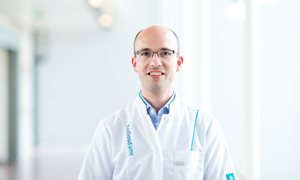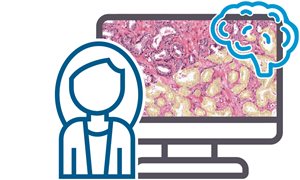
Researchers from Radboud university medical center and Amsterdam UMC received a 2.5 million euro grant for promising care from the National Health Care Institute and ZonMW. They will investigate if use of PET/CT scans during follow-up of lung cancer patients results in a higher and earlier detection rate of recurrences. ‘With the increasing availability of local therapeutic options for patients with oligometastatic disease recurrence, early detection of lung cancer recurrence is likely to prolong survival’, says Iris Walraven, principal investigator from Radboudumc.
After diagnosis, many lung cancer patients receive a treatment aimed at cure. Unfortunately, a significant proportion of lung cancer patients develop recurrences during follow-up. A team of researchers led by Iris Walraven (clinical epidemiologist) of the Radboudumc and Annemarie Becker (pulmonologist) of Amsterdam UMC will now investigate if the detection of metastases can be improved. Walraven explains: ‘In the Netherlands, routine follow-up of lung cancer patients consists of chest computed tomography (CT) scans of the thoracic region. With this one-size-fits-all approach, local recurrences can be detected while the risk of distant recurrence is much higher. Therefore, recurrences often develop outside the scope of the scan. A PET/CT scan allows you to detect metastases outside the thoracic region as well. With this grant, we are going to investigate whether the use of PET/CT scans during follow-up care improves the health-related quality of life and survival of lung cancer patients.’
Quality of life
The current follow-up approach was introduced before potentially survival prolonging treatments in oligometastatic (up to 5-10 recurrences) disease became available. As a result, these metastases currently are often detected at a late stage, reducing treatment options. Becker explains: ‘In recent years, treatment options for patients with a limited number of metastases have improved significantly, mainly attributable to the introduction of highly targeted radiation treatment of metastases, immunotherapy or surgery. This improved the likelihood of long-term survival with a good health-related quality of life. But this off-course requires early detection of the metastases. We are therefore very pleased with this grant to investigate whether this can be done more effectively with the help of a PET-CT scan.'
For the study, the researchers from Radboudumc and Amsterdam UMC will receive 2.5 million euros from the National Health Care Institute and ZonMW through the Promising Care Subsidy Scheme. In addition to the research costs, the care costs of the treatment during the research are being paid. After all, the intervention is not yet reimbursed from the basic insurance. Upon completion of the study, the Haelth Care Institute will immediately decide based on the scientific evidence if the treatment works. If it does, the treatment will be reimbursed through basic insurance. Twenty-four other hospitals in the Netherlands are also participating in the study.
-
Want to know more about these subjects? Click on the buttons below for more news.
More information
Annemarie Eek

wetenschapsvoorlichter
Related news items

Arthritis drug use to limit antibiotics in blood cancer Drug Anakinra strengthens gut lining and inhibits inflammation
12 May 2022 Researchers from the University of Adelaide and the Radboud University Medical Center have repurposed an arthritis drug to restrict the use of antibiotics in the treatment of side effects caused by blood cancer, including leukemia, lymphoma and myeloma. go to page
European guideline recommends MRI screening in women with dense breasts
15 March 2022 New recommendation advocates personalized approach in breast cancer screening with more attention for breast characteristics and individual wishes. go to page-(1).jpg.aspx?width=500&height=333&ext=.jpg&type=BlockColumn1Zoom1)
Quilting gives better outcomes in breast cancer surgery Closing cavity after surgery with special suturing technique reduces complications
13 January 2022 Quilting reduces complications after a mastectomy or axillary lymph node dissection and offers many benefits to a patient. With this technique, a surgeon closes the cavity under the wound with needle and thread. A drain is no longer necessary. go to page


